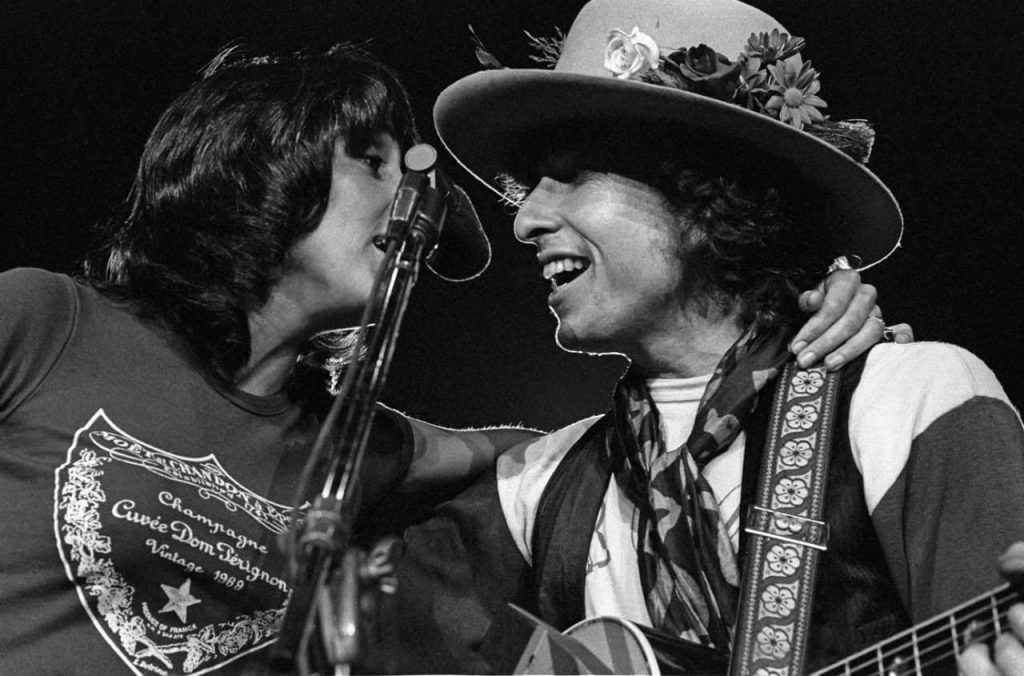
A Bitter Hymn of Questioning Faith: Bob Dylan and Joan Baez’s “With God On Our Side”
Ah, “With God On Our Side.” Even now, the title itself carries a weight of irony, a subtle sneer at the unquestioning faith that so often fuels conflict. When Bob Dylan penned this powerful anti-war anthem, he wasn’t just writing a song; he was igniting a fire, challenging the comfortable narratives we tell ourselves about history and morality. Released on his 1963 album, “The Times They Are a-Changin’,” this track wasn’t a radio-friendly single primed for chart dominance. Instead, it became a cornerstone of his live performances and a deeply resonant piece for a generation grappling with the complexities of war and peace. While it did not chart as a single, the album itself reached number 20 on the Billboard Top Pop Albums chart, solidifying Dylan’s position as a vital voice of the era.
The story behind “With God On Our Side” is rooted in Dylan’s deep-seated skepticism towards authority and his growing awareness of the darker sides of American history. It was a time of burgeoning civil rights movements and escalating tensions in Vietnam, a period when young people were beginning to question the established order. Dylan, ever the keen observer, channeled these anxieties into a song that dared to ask uncomfortable questions about the justifications for war. He didn’t just sing about the present; he delved into the past, tracing a lineage of violence from the Indian Wars to the Cold War, each conflict rationalized by the same chilling phrase: “with God on our side.”
The meaning of “With God On Our Side” is as relevant today as it was in the 1960s. It’s a song about the dangers of blind faith, the ease with which we can convince ourselves that our actions are righteous, even when they inflict immense suffering. It’s about the hypocrisy of claiming moral superiority while perpetrating violence, the way we conveniently rewrite history to suit our own agendas. Dylan’s lyrics, delivered in his characteristic nasal twang, are a masterclass in understated outrage. He doesn’t shout or preach; he simply lays out the facts, exposing the contradictions and leaving the listener to draw their own conclusions.
For those of us who lived through those tumultuous years, “With God On Our Side” evokes a flood of memories. The anti-war protests, the teach-ins, the heated debates about morality and patriotism. Joan Baez, who often performed the song alongside Dylan, amplified its impact, her clear, unwavering voice adding another layer of emotional depth. She was, as many remember, a powerful force for peace, and her renditions of this song became anthems for those seeking a more just world.
Think back to the folk clubs and coffeehouses, the spaces where young people gathered to discuss and debate the issues of the day. Dylan and Baez, with their acoustic guitars and powerful lyrics, were the voices of that generation, their songs providing a soundtrack for a period of profound social change. “With God On Our Side” wasn’t just a song; it was a statement, a challenge, a call to conscience. It remains a timeless reminder of the importance of questioning authority, of refusing to accept simplistic narratives, and of recognizing the shared humanity that transcends national borders and religious beliefs. It is a song that still echoes, a haunting melody that urges us to look beyond the surface and confront the uncomfortable truths of our past and present.